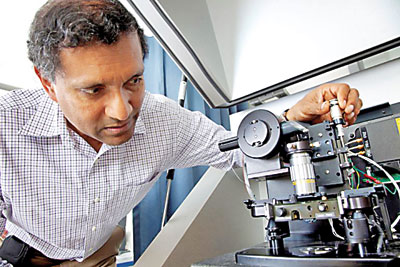News
Lankan Prof. elected Fellow of the Royal Society of London for pioneering work in Nanotechnology
View(s):An eminent Sri Lankan professor, who has done pioneering work in Nanotechnology research, Hemantha Kumar Wickramasinghe has been elected a Fellow of the Royal Society of London for ‘Improving Natural Knowledge’. He joins an august company among whom have been Isaac Newton, Christopher Wren, Charles Darwin and Stephen Hawking.

Prof. Hemantha Kumar Wickramasinghe
His formal induction into the Royal Society will be on July 12 in London. Current Fellows of the Royal Society include Jocelyn Bell Burnell, Francis Crick and Tim Berners-Lee.
In a release from the University of California, Irvine (UCI), Prof. Wickramasinghe states, “I am thrilled and humbled to have been elected a Fellow of the Royal Society, the oldest Science academy in the world, which has elected to its fellowship, most of the scientific giants of all time. It is rewarding to see organisations with global stature, putting the spotlight on the work I have done in my career, especially here at UCI.”
Prof. Wickramasinghe holds joint appointments in UCI’s Biomedical Engineering, Materials Science and Engineering Ddepartments, and is the UCI Distinguished Professor and Nicolaos G. & Sue Curtis Alexopoulos Presidential Chair in Electrical Engineering andComputer Science, and also the Henry Samueli Endowed Chair in Engineering.
Prof. Wickramasinghe received a PhD. from the University of London in Electrical Engineering in 1974, having earned his BSc. there in 1970. Following a post-Doctoral appointment at Stanford University, he joined the Faculty in the Electrical Engineering Department at University College London in 1978. In 1984, he joined IBM and worked there for many years. Latterly managing Nanoscience and Technology research at IBM’s Almaden Research Center in San Jose, California.
The release from UCI, written by Brian Bell, states: “With more than 100 patents to his name, Wickramasinghe is a pioneer in Nanotechnology research and innovation. He led the development of such technologies as the Vibrating-mode Atomic Force microscope, Magnetic Force microscope, Electrostatic Force microscope, Kelvin Probe Force microscope, Scanning Thermal microscope and Apertureless Near-field Optical microscope. Most of these Scanning Probe microscopes are now standard instruments for Nanoscale characterization. ”

